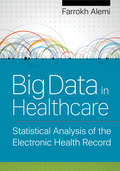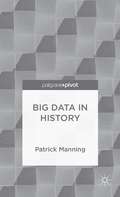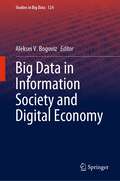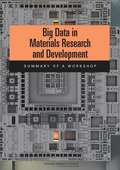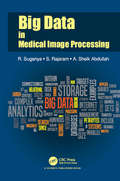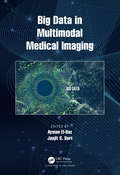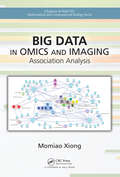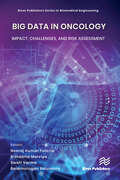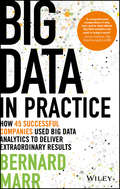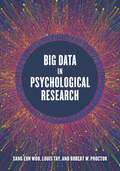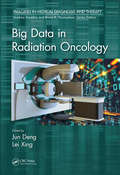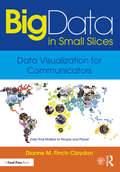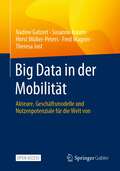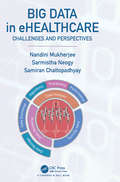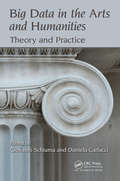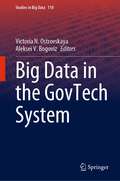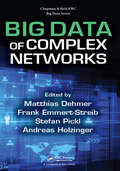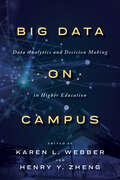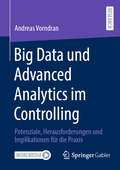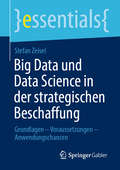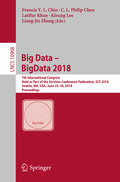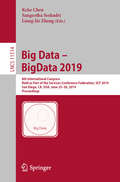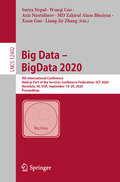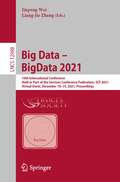- Table View
- List View
Big Data in Healthcare: Statistical Analysis of the Electronic Health Record
by Farrokh AlemiBig Data in Healthcare: Statistical Analysis of the Electronic Health Record provides the statistical tools that healthcare leaders need to organize and interpret their data. Designed for accessibility to those with a limited mathematics background, the book demonstrates how to leverage EHR data for applications as diverse as healthcare marketing, pay for performance, cost accounting, and strategic management. Topics include: using real-world data to compare hospitals' performance; measuring the prognosis of patients through massive data; distinguishing between fake claims and true improvements; comparing the effectiveness of different interventions using causal analysis; benchmarking different clinicians on the same set of patients, and more. This book can be used in introductory courses on hypothesis testing, intermediate courses on regression, and advanced courses on causal analysis. It can also be used to learn SQL language. Its extensive online instructor resources include course syllabi, PowerPoint and video lectures, Excel exercises, individual and team assignments, answers to assignments, and student-organized tutorials. Big Data in Healthcare applies the building blocks of statistical thinking to the basic challenges that healthcare leaders face every day. Prepare for those challenges with the clear understanding of your data that statistical analysis can bring—and make the best possible decisions for maximum performance in the competitive field of healthcare.
Big Data in History
by Patrick ManningBig Data in History introduces the project to create a world-historical archive, tracing the last four centuries of historical dynamics and change. Chapters address the archive's overall plan, how to interpret the past through a global archive, the missions of gathering records, linking local data into global patterns, and exploring the results.
Big Data in Information Society and Digital Economy (Studies in Big Data #124)
by Aleksei V. BogovizThis book redefines the essence of the information society and the digital economy, offering a new approach to their management and organization based on big data. The novelty of the new approach is that it ensures the use of the advanced technological capabilities of the Fourth Industrial Revolution to accelerate socio-economic development. The success of the new approach is based on progressive social institutions and advanced big data technology. Theoretical issues, methodological developments, and the author’s applied recommendations are consistently presented in forty chapters distributed in five sections. The book contains cases that reveal the practical experience of the Eurasian Economic Union (EAEU). The intended readership of the book is scientists. The book is interesting and useful for them because it presents an innovative model of information society and digital economy development driven by big data.
Big Data in Materials Research and Development: Summary of a Workshop
by Maureen Mellody"Big Data in Materials Research and Development" is the summary of a workshop convened by the National Research Council Standing Committee on Defense Materials Manufacturing and Infrastructure in February 2014 to discuss the impact of big data on materials and manufacturing. The materials science community would benefit from appropriate access to data and metadata for materials development, processing, application development, and application life cycles. Currently, that access does not appear to be sufficiently widespread, and many workshop participants captured the constraints and identified potential improvements to enable broader access to materials and manufacturing data and metadata. This report discusses issues in defense materials, manufacturing and infrastructure, including data ownership and access; collaboration and exploitation of big data's capabilities; and maintenance of data.
Big Data in Medical Image Processing
by S. Rajaram R. Suganya A. Sheik AbdullahThe field of medical imaging seen rapid development over the last two decades and has consequently revolutionized the way in which modern medicine is practiced. Diseases and their symptoms are constantly changing therefore continuous updating is necessary for the data to be relevant. Diseases fall into different categories, even a small difference in symptoms may result in categorising it in a different group altogether. Thus analysing data accurately is of critical importance. This book concentrates on diagnosing diseases like cancer or tumor from different modalities of images. This book is divided into the following domains: Importance of big data in medical imaging, pre-processing, image registration, feature extraction, classification and retrieval. It is further supplemented by the medical analyst for a continuous treatment process. The book provides an automated system that could retrieve images based on user’s interest to a point of providing decision support. It will help medical analysts to take informed decisions before planning treatment and surgery. It will also be useful to researchers who are working in problems involved in medical imaging.
Big Data in Multimodal Medical Imaging
by Jasjit S. Suri Ayman El-BazThere is an urgent need to develop and integrate new statistical, mathematical, visualization, and computational models with the ability to analyze Big Data in order to retrieve useful information to aid clinicians in accurately diagnosing and treating patients. The main focus of this book is to review and summarize state-of-the-art big data and deep learning approaches to analyze and integrate multiple data types for the creation of a decision matrix to aid clinicians in the early diagnosis and identification of high risk patients for human diseases and disorders. Leading researchers will contribute original research book chapters analyzing efforts to solve these important problems.
Big Data in Omics and Imaging: Association Analysis (Chapman & Hall/CRC Mathematical and Computational Biology)
by Momiao XiongBig Data in Omics and Imaging: Association Analysis addresses the recent development of association analysis and machine learning for both population and family genomic data in sequencing era. It is unique in that it presents both hypothesis testing and a data mining approach to holistically dissecting the genetic structure of complex traits and to designing efficient strategies for precision medicine. The general frameworks for association analysis and machine learning, developed in the text, can be applied to genomic, epigenomic and imaging data. FEATURES Bridges the gap between the traditional statistical methods and computational tools for small genetic and epigenetic data analysis and the modern advanced statistical methods for big data Provides tools for high dimensional data reduction Discusses searching algorithms for model and variable selection including randomization algorithms, Proximal methods and matrix subset selection Provides real-world examples and case studies Will have an accompanying website with R code The book is designed for graduate students and researchers in genomics, bioinformatics, and data science. It represents the paradigm shift of genetic studies of complex diseases– from shallow to deep genomic analysis, from low-dimensional to high dimensional, multivariate to functional data analysis with next-generation sequencing (NGS) data, and from homogeneous populations to heterogeneous population and pedigree data analysis. Topics covered are: advanced matrix theory, convex optimization algorithms, generalized low rank models, functional data analysis techniques, deep learning principle and machine learning methods for modern association, interaction, pathway and network analysis of rare and common variants, biomarker identification, disease risk and drug response prediction.
Big Data in Oncology: Impact, Challenges, and Risk Assessment (River Publishers Series in Biomedical Engineering)
by Balamurugan Balusamy Rishabha Malviya Neeraj Kumar Fuloria Swati VermaWe are in the era of large-scale science. In oncology there is a huge number of data sets grouping information on cancer genomes, transcriptomes, clinical data, and more. The challenge of big data in cancer is to integrate all this diversity of data collected into a unique platform that can be analyzed, leading to the generation of readable files. The possibility of harnessing information from all the accumulated data leads to an improvement in cancer patient treatment and outcome. Solving the big data problem in oncology has multiple facets. Big data in Oncology: Impact, Challenges, and Risk Assessment brings together insights from emerging sophisticated information and communication technologies such as artificial intelligence, data science, and big data analytics for cancer management. This book focuses on targeted disease treatment using big data analytics. It provides information about targeted treatment in oncology, challenges and application of big data in cancer therapy. Recent developments in the fields of artificial intelligence, machine learning, medical imaging, personalized medicine, computing and data analytics for improved patient care. Description of the application of big data with AI to discover new targeting points for cancer treatment. Summary of several risk assessments in the field of oncology using big data. Focus on prediction of doses in oncology using big data The most targeted or relevant audience is academics, research scholars, health care professionals, hospital management, pharmaceutical chemists, the biomedical industry, software engineers and IT professionals.
Big Data in Practice: How 45 Successful Companies Used Big Data Analytics to Deliver Extraordinary Results
by Bernard MarrThe best-selling author of Big Data is back, this time with a unique and in-depth insight into how specific companies use big data. Big data is on the tip of everyone's tongue. Everyone understands its power and importance, but many fail to grasp the actionable steps and resources required to utilise it effectively. This book fills the knowledge gap by showing how major companies are using big data every day, from an up-close, on-the-ground perspective. From technology, media and retail, to sport teams, government agencies and financial institutions, learn the actual strategies and processes being used to learn about customers, improve manufacturing, spur innovation, improve safety and so much more. Organised for easy dip-in navigation, each chapter follows the same structure to give you the information you need quickly. For each company profiled, learn what data was used, what problem it solved and the processes put it place to make it practical, as well as the technical details, challenges and lessons learned from each unique scenario. Learn how predictive analytics helps Amazon, Target, John Deere and Apple understand their customers Discover how big data is behind the success of Walmart, LinkedIn, Microsoft and more Learn how big data is changing medicine, law enforcement, hospitality, fashion, science and banking Develop your own big data strategy by accessing additional reading materials at the end of each chapter
Big Data in Psychological Research
by Robert W. Proctor Louis Tay Sang Eun WooTechnological advances have led to an abundance of widely available data on every aspect of life today. Psychologists today have more information than ever before on human cognition, emotion, attitudes, and behavior. Big Data in Psychological Research addresses the opportunities and challenges that these data present to psychological researchers. This edited collection provides an overview of theoretical approaches to the utility and purpose of big data, approaches to research design and analysis, collection methods, applications, limitations, best practice recommendations, and key issues related to privacy, security, and ethical concerns that are essential to understand for anyone working with big data. The book also discusses potential future research directions aimed at improving the quality and interpretation of big data projects, as well as the training and evaluation of psychological science teams that conduct research using big data.
Big Data in Radiation Oncology (Imaging in Medical Diagnosis and Therapy)
by Jun Deng and Lei XingBig Data in Radiation Oncology gives readers an in-depth look into how big data is having an impact on the clinical care of cancer patients. While basic principles and key analytical and processing techniques are introduced in the early chapters, the rest of the book turns to clinical applications, in particular for cancer registries, informatics, radiomics, radiogenomics, patient safety and quality of care, patient-reported outcomes, comparative effectiveness, treatment planning, and clinical decision-making. More features of the book are: Offers the first focused treatment of the role of big data in the clinic and its impact on radiation therapy. Covers applications in cancer registry, radiomics, patient safety, quality of care, treatment planning, decision making, and other key areas. Discusses the fundamental principles and techniques for processing and analysis of big data. Address the use of big data in cancer prevention, detection, prognosis, and management. Provides practical guidance on implementation for clinicians and other stakeholders. Dr. Jun Deng is a professor at the Department of Therapeutic Radiology of Yale University School of Medicine and an ABR board certified medical physicist at Yale-New Haven Hospital. He has received numerous honors and awards such as Fellow of Institute of Physics in 2004, AAPM Medical Physics Travel Grant in 2008, ASTRO IGRT Symposium Travel Grant in 2009, AAPM-IPEM Medical Physics Travel Grant in 2011, and Fellow of AAPM in 2013. Lei Xing, Ph.D., is the Jacob Haimson Professor of Medical Physics and Director of Medical Physics Division of Radiation Oncology Department at Stanford University. His research has been focused on inverse treatment planning, tomographic image reconstruction, CT, optical and PET imaging instrumentations, image guided interventions, nanomedicine, and applications of molecular imaging in radiation oncology. Dr. Xing is on the editorial boards of a number of journals in radiation physics and medical imaging, and is recipient of numerous awards, including the American Cancer Society Research Scholar Award, The Whitaker Foundation Grant Award, and a Max Planck Institute Fellowship.
Big Data in Small Slices: Analysis and Visualization for Journalists and Communications Professionals
by Dianne M. Finch-ClaydonThis book offers an engaging and accessible introduction to data visualization for communicators, covering everything from data collection and analysis to the creation of effective data visuals. Straying from the typical "how to visualize data" genre often written for technical audiences, Big Data in Small Slices offers those new to data gathering and visualization the opportunity to better understand data itself. Using the concept of the "data backstory," each chapter features discussions with experts, from marine scientists to pediatricians and city government officials, who produce datasets in their daily work. The reader is guided through the process of designing effective visualizations based on their data, delving into how datasets are produced and vetted, and how to assess their weaknesses and strengths, ultimately offering readers the knowledge needed to produce their own effective data visuals. This book is an invaluable resource for anyone interested in data visualization and storytelling, from journalism and communications students to public relations professionals. A detailed accompanying website features additional material for readers, including links to all the original datasets used in the text, at www.bigdatainsmallslices.com
Big Data in der Mobilität: Akteure, Geschäftsmodelle und Nutzenpotenziale für die Welt von morgen
by Horst Müller-Peters Susanne Knorre Fred Wagner Nadine Gatzert Theresa JostDieses Open-Access-Buch befasst sich mit den gesellschaftlich und wirtschaftlich weitreichenden Potenzialen von „Big Data in der Mobilität“. Zunächst werden der Mobilitätsmarkt mit seinen Akteuren sowie deren Interessen und oft paradoxen Verhaltensweisen vorgestellt sowie eine „Mobilitäts-Datenkarte“ abgeleitet. Darauf aufbauend werden auf Basis mehrerer empirischer Studien die Chancen und Risiken der Datenerhebung und deren Nutzung für neue Geschäftsmodelle und das Gemeinwohl, nicht zuletzt den Klimaschutz, analysiert. Daraus werden Nutzenpotenziale „für die Welt von morgen“ abgeleitet und die notwendigen politischen und gesellschaftlichen Voraussetzungen skizziert. Ein Ausblick auf die Zukunft der Mobilität und Implikationen für betroffene Branchen – am Beispiel der Versicherungswirtschaft – runden das Buch ab.
Big Data in ehealthcare: Challenges and Perspectives
by Nandini Mukherjee Samiran Chattopadhyay Sarmistha NeogyThis book focuses on the different aspects of handling big data in healthcare. It showcases the current state-of-the-art technology used for storing health records and health data models. It also focuses on the research challenges in big data acquisition, storage, management and analysis.
Big Data in the Arts and Humanities: Theory and Practice (Data Analytics Applications)
by Giovanni Schiuma Daniela CarlucciAs digital technologies occupy a more central role in working and everyday human life, individual and social realities are increasingly constructed and communicated through digital objects, which are progressively replacing and representing physical objects. They are even shaping new forms of virtual reality. This growing digital transformation coupled with technological evolution and the development of computer computation is shaping a cyber society whose working mechanisms are grounded upon the production, deployment, and exploitation of big data. In the arts and humanities, however, the notion of big data is still in its embryonic stage, and only in the last few years, have arts and cultural organizations and institutions, artists, and humanists started to investigate, explore, and experiment with the deployment and exploitation of big data as well as understand the possible forms of collaborations based on it. Big Data in the Arts and Humanities: Theory and Practice explores the meaning, properties, and applications of big data. This book examines therelevance of big data to the arts and humanities, digital humanities, and management of big data with and for the arts and humanities. It explores the reasons and opportunities for the arts and humanities to embrace the big data revolution. The book also delineates managerial implications to successfully shape a mutually beneficial partnership between the arts and humanities and the big data- and computational digital-based sciences. Big data and arts and humanities can be likened to the rational and emotional aspects of the human mind. This book attempts to integrate these two aspects of human thought to advance decision-making and to enhance the expression of the best of human life.
Big Data in the GovTech System (Studies in Big Data #110)
by Victoria N. Ostrovskaya Aleksei V. BogovizThis book presents applications and solutions of Big Data in the GovTech system and recommendations for regulating the institutions of the digital economy and information society for the wide application of Big Data with the use of the institutional approach. In this book, a systematic scientific understanding of GovTech is formed, the central place of Big Data in this system is substantiated, and modern experience in the functioning and development of this system is considered in detail. The contribution of the book to the literature is to bridge the gap between theory and practice of GovTech through a comprehensive study of all its manifestations in the three parts of the book. The first part is devoted to GovTech in the provision of high-tech educational services based on Big Data. The second part reflects state regulation of the economy by industry using Big Data in the GovTech. The third part outlined the digital divide and the experience of overcoming it with the help of GovTech based on Big Data.The practical significance of the book lies in the fact that it offers a holistic practical guide to the development of the GovTech system based on Big Data. The book will be of interest to academic scientists studying GovTech, as it clarified its categorical apparatus and scientific basis. The subjects of management in GovTech form the secondary target audience of this book, which provides them with numerous cases from the experience of modern Russia, as well as applied recommendations for improving the efficiency of the GovTech system based on Big Data. The book is multidisciplinary and is intended for scientists from various fields of science (pedagogy, economics, business, law, management, and ICT).
Big Data of Complex Networks (Chapman & Hall/CRC Big Data Series)
by Matthias Dehmer, Frank Emmert-Streib, Stefan Pickl and Andreas HolzingerBig Data of Complex Networks presents and explains the methods from the study of big data that can be used in analysing massive structural data sets, including both very large networks and sets of graphs. As well as applying statistical analysis techniques like sampling and bootstrapping in an interdisciplinary manner to produce novel techniques for analyzing massive amounts of data, this book also explores the possibilities offered by the special aspects such as computer memory in investigating large sets of complex networks. Intended for computer scientists, statisticians and mathematicians interested in the big data and networks, Big Data of Complex Networks is also a valuable tool for researchers in the fields of visualization, data analysis, computer vision and bioinformatics. Key features: Provides a complete discussion of both the hardware and software used to organize big data Describes a wide range of useful applications for managing big data and resultant data sets Maintains a firm focus on massive data and large networks Unveils innovative techniques to help readers handle big data Matthias Dehmer received his PhD in computer science from the Darmstadt University of Technology, Germany. Currently, he is Professor at UMIT – The Health and Life Sciences University, Austria, and the Universität der Bundeswehr München. His research interests are in graph theory, data science, complex networks, complexity, statistics and information theory. Frank Emmert-Streib received his PhD in theoretical physics from the University of Bremen, and is currently Associate professor at Tampere University of Technology, Finland. His research interests are in the field of computational biology, machine learning and network medicine. Stefan Pickl holds a PhD in mathematics from the Darmstadt University of Technology, and is currently a Professor at Bundeswehr Universität München. His research interests are in operations research, systems biology, graph theory and discrete optimization. Andreas Holzinger received his PhD in cognitive science from Graz University and his habilitation (second PhD) in computer science from Graz University of Technology. He is head of the Holzinger Group HCI-KDD at the Medical University Graz and Visiting Professor for Machine Learning in Health Informatics Vienna University of Technology.
Big Data on Campus: Data Analytics and Decision Making in Higher Education
by Karen L. Webber and Henry Y. ZhengHow data-informed decision making can make colleges and universities more effective institutions.The continuing importance of data analytics is not lost on higher education leaders, who face a multitude of challenges, including increasing operating costs, dwindling state support, limits to tuition increases, and increased competition from the for-profit sector. To navigate these challenges, savvy leaders must leverage data to make sound decisions. In Big Data on Campus, leading data analytics experts and higher ed leaders show the role that analytics can play in the better administration of colleges and universities. Aimed at senior administrative leaders, practitioners of institutional research, technology professionals, and graduate students in higher education, the book opens with a conceptual discussion of the roles that data analytics can play in higher education administration. Subsequent chapters address recent developments in technology, the rapid accumulation of data assets, organizational maturity in building analytical capabilities, and methodological advancements in developing predictive and prescriptive analytics. Each chapter includes a literature review of the research and application of analytics developments in their respective functional areas, a discussion of industry trends, examples of the application of data analytics in their decision process, and other related issues that readers may wish to consider in their own organizational environment to find opportunities for building robust data analytics capabilities.Using a series of focused discussions and case studies, Big Data on Campus helps readers understand how analytics can support major organizational functions in higher education, including admission decisions, retention and enrollment management, student life and engagement, academic and career advising, student learning and assessment, and academic program planning. The final section of the book addresses major issues and human factors involved in using analytics to support decision making; the ethical, cultural, and managerial implications of its use; the role of university leaders in promoting analytics in decision making; and the need for a strong campus community to embrace the analytics revolution. Contributors: Rana Glasgal, J. Michael Gower, Tom Gutman, Brian P. Hinote, Braden J. Hosch, Aditya Johri, Christine M. Keller, Carrie Klein, Jaime Lester, Carrie Hancock Marcinkevage, Gail B. Marsh, Susan M. Menditto, Jillian N. Morn, Valentina Nestor, Cathy O'Bryan, Huzefa Rangwala, Timothy Renick, Charles Tegen, Rachit Thariani, Chris Tompkins, Lindsay K. Wayt, Karen L. Webber, Henry Y. Zheng, Ying Zhou
Big Data over Networks
by Shuguang Cui Alfred O. Hero Iii Zhi-Quan Luo José M. F. MouraUtilising both key mathematical tools and state-of-the-art research results, this text explores the principles underpinning large-scale information processing over networks and examines the crucial interaction between big data and its associated communication, social and biological networks. Written by experts in the diverse fields of machine learning, optimisation, statistics, signal processing, networking, communications, sociology and biology, this book employs two complementary approaches: first analysing how the underlying network constrains the upper-layer of collaborative big data processing, and second, examining how big data processing may boost performance in various networks. Unifying the broad scope of the book is the rigorous mathematical treatment of the subjects, which is enriched by in-depth discussion of future directions and numerous open-ended problems that conclude each chapter. Readers will be able to master the fundamental principles for dealing with big data over large systems, making it essential reading for graduate students, scientific researchers and industry practitioners alike.
Big Data und Advanced Analytics im Controlling: Potenziale, Herausforderungen und Implikationen für die Praxis
by Andreas VorndranDie Digitalisierung und Entwicklungen im Gebiet der künstlichen Intelligenz haben in den letzten Jahren erhebliche Veränderungen in der Gesellschaft und der Unternehmenspraxis hervorgerufen. Aufkommende Technologien in den Feldern Big Data und Advanced Analytics werden auch im Controlling zunehmend diskutiert oder bereits eingesetzt. Dabei befinden sich der Wissensstand, inwieweit Big Data und Advanced Analytics das Controlling beeinflussen und verändern können, und die praktische Anwendung noch in einem frühen Stadium. Diese Arbeit befasst sich deshalb mit der Untersuchung der möglichen Auswirkungen von Big Data und Advanced Analytics im Controlling. Vor diesem Hintergrund werden die Einflüsse dieser digitalen Trends auf den Informationsversorgungsprozess des Controllings, auf die Erfüllung Controlling-spezifischer Anforderungen an Informationen und auf das Forecasting, die Budgetierung und die strategische Planung analysiert. Ferner werden praxisrelevante Herausforderungen, Grenzen und Risiken bei der Implementierung und Nutzung identifiziert sowie Implikationen zu deren Umgang zur Ausschöpfung der Potenziale abgeleitet.
Big Data und Data Science in der strategischen Beschaffung: Grundlagen – Voraussetzungen – Anwendungschancen (essentials)
by Stefan ZeiselBig Data und Data Science sind Trends, die sowohl in der Wissenschaft als auch in Unternehmen auf großes Interesse stoßen. Dieses essential zeigt einen konzeptionellen Rahmen auf, um die Grundlagen von Big Data und Data Science besser zu verstehen. Einkaufsentscheider und Einkaufsorganisationen können dann aufbauend auf der Beschaffungsdigitalisierung sowie weiteren Datenquellen ein Big Data Warehouse konzipieren, welches die Voraussetzung schafft, um wichtige Beschaffungsprobleme zu lösen. Analytische Methoden werden genauso beleuchtet, wie neue Fähigkeiten in bereichsübergreifenden Teams. Abschließend werden 30 konkrete Anwendungsfälle von Big Data für die strategische Beschaffung vorgestellt.
Big Data – BigData 2018: 7th International Congress, Held as Part of the Services Conference Federation, SCF 2018, Seattle, WA, USA, June 25–30, 2018, Proceedings (Lecture Notes in Computer Science #10968)
by Latifur Khan Liang-Jie Zhang Kisung Lee Francis Y. L. Chin C. L. Philip ChenThis volume constitutes the proceedings of the 7th International Conference on BIGDATA 2018, held as Part of SCF 2018 in Seattle, WA, USA in June 2018.The 22 full papers together with 10 short papers published in this volume were carefully reviewed and selected from 97 submissions. They are organized in topical sections such as Data analysis, data as a service, services computing, data conversion, data storage, data centers, dataflow architectures, data compression, data exchange, data modeling, databases, and data management.
Big Data – BigData 2019: 8th International Congress, Held as Part of the Services Conference Federation, SCF 2019, San Diego, CA, USA, June 25–30, 2019, Proceedings (Lecture Notes in Computer Science #11514)
by Liang-Jie Zhang Keke Chen Sangeetha SeshadriThis volume constitutes the proceedings of the 8th International Congress on BIGDATA 2019, held as Part of SCF 2019 in San Diego, CA, USA in June 2019. The 9 full papers presented in this volume were carefully reviewed and selected from 14 submissions. They cover topics such as: Big Data Models and Algorithms; Big Data Architectures; Big Data Management; Big Data Protection, Integrity and Privacy; Security Applications of Big Data; Big Data Search and Mining; Big Data for Enterprise, Government and Society.
Big Data – BigData 2020: 9th International Conference, Held as Part of the Services Conference Federation, SCF 2020, Honolulu, HI, USA, September 18-20, 2020, Proceedings (Lecture Notes in Computer Science #12402)
by Xuan Guo Surya Nepal Liang-Jie Zhang Wenqi Cao Aziz Nasridinov MD Zakirul Alam BhuiyanThis book constitutes the proceedings of the 9th International Conference on Big Data, BigData 2020, held as part of SCF 2020, during September 18-20, 2020. The conference was planned to take place in Honolulu, HI, USA and was changed to a virtual format due to the COVID-19 pandemic. The 16 full and 3 short papers presented were carefully reviewed and selected from 52 submissions. The topics covered are Big Data Architecture, Big Data Modeling, Big Data As A Service, Big Data for Vertical Industries (Government, Healthcare, etc.), Big Data Analytics, Big Data Toolkits, Big Data Open Platforms, Economic Analysis, Big Data for Enterprise Transformation, Big Data in Business Performance Management, Big Data for Business Model Innovations and Analytics, Big Data in Enterprise Management Models and Practices, Big Data in Government Management Models and Practices, and Big Data in Smart Planet Solutions.
Big Data – BigData 2021: 10th International Conference, Held as Part of the Services Conference Federation, SCF 2021, Virtual Event, December 10–14, 2021, Proceedings (Lecture Notes in Computer Science #12988)
by Liang-Jie Zhang Jinpeng WeiThis book constitutes the proceedings of the 10th International Conference on Big Data, BigData 2021, held online as part of SCF 2021, during December 10-14, 2021.The 6 full and 2 short papers presented were carefully reviewed and selected from 53 submissions. The topics covered are Big Data Architecture, Big Data Modeling, Big Data As A Service, Big Data for Vertical Industries (Government, Healthcare, etc.), Big Data Analytics, Big Data Toolkits, Big Data Open Platforms, Economic Analysis, Big Data for Enterprise Transformation, Big Data in Business Performance Management, Big Data for Business Model Innovations and Analytics, Big Data in Enterprise Management Models and Practices, Big Data in Government Management Models and Practices, and Big Data in Smart Planet Solutions.
